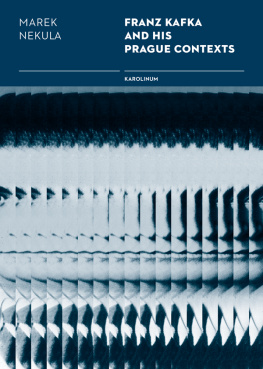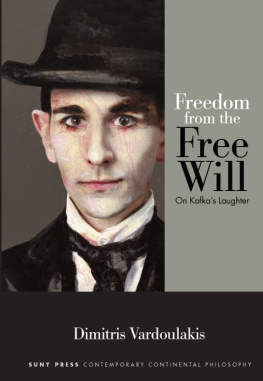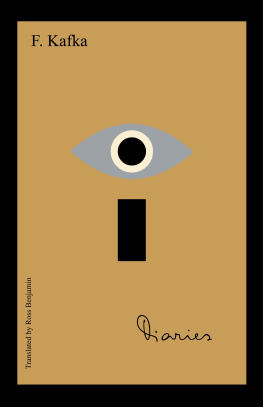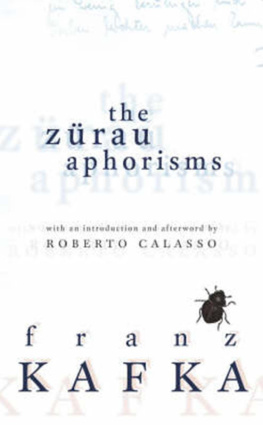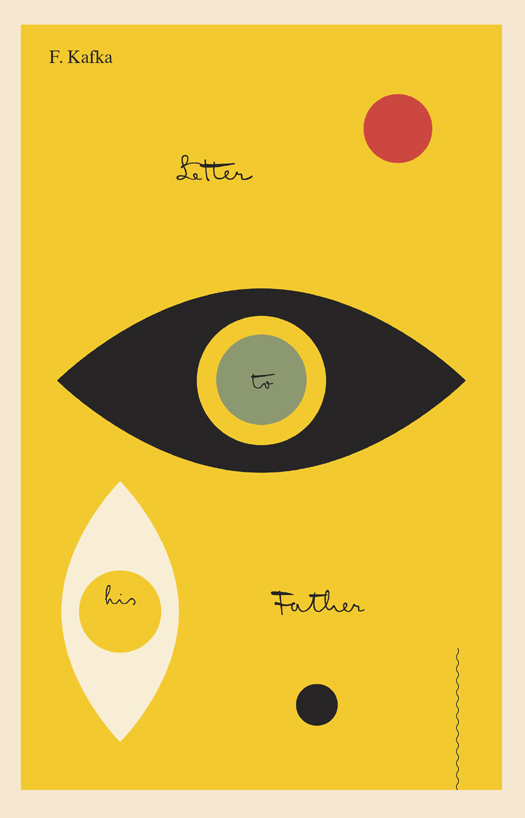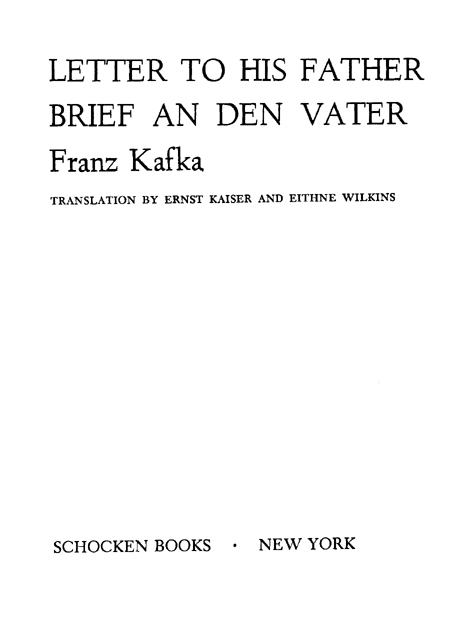Copyright 1953, 1954, 1966 by Schocken Books Inc.
Library of Congress Catalog Card No. 6614874
This work is a translation of the German Brief an den Vater, edited by Max Brod.
eISBN: 978-0-8041-5075-0
Cover design by Peter Mendelsund
v3.1_r3
Contents
LETTER TO HIS FATHER
Dearest Father,
You asked me recently why I maintain that I am afraid of you. As usual, I was unable to think of any answer to your question, partly for the very reason that I am afraid of you, and partly because an explanation of the grounds for this fear would mean going into far more details than I could even approximately keep in mind while talking. And if I now try to give you an answer in writing, it will still be very incomplete, because, even in writing, this fear and its consequences hamper me in relation to you and because the magnitude of the subject goes far beyond the scope of my memory and power of reasoning.
To you the matter always seemed very simple, at least in so far as you talked about it in front of me, and indiscriminately in front of many other people. It looked to you more or less as follows: you have worked hard all your life, have sacrificed everything for your children, above all for me, consequently I have lived high and handsome, have been completely at liberty to learn whatever I wanted, and have had no cause for material worries, which means worries of any kind at all. You have not expected any gratitude for this, knowing what childrens gratitude is like, but have expected at least some sort of obligingness, some sign of sympathy. Instead I have always hidden from you, in my room, among my books, with crazy friends, or with extravagant ideas. I have never talked to you frankly; I have never come to you when you were in the synagogue, never visited you at Franzensbad, nor indeed ever shown any family feeling; I have never taken any interest in the business or your other concerns; I left the factory on your hands and walked off; I encouraged Ottla in her obstinacy, and never lifted a finger for you (never even got you a theater ticket), while I do everything for my friends. If you sum up your judgment of me, the result you get is that, although you dont charge me with anything downright improper or wicked (with the exception perhaps of my latest marriage plan), you do charge me with coldness, estrangement, and ingratitude. And, what is more, you charge me with it in such a way as to make it seem my fault, as though I might have been able, with something like a touch on the steering wheel, to make everything quite different, while you arent in the slightest to blame, unless it be for having been too good to me.
This, your usual way of representing it, I regard as accurate only in so far as I too believe you are entirely blameless in the matter of our estrangement. But I am equally entirely blameless. If I could get you to acknowledge this, then what would be possible isnot, I think, a new life, we are both much too old for thatbut still, a kind of peace; no cessation, but still, a diminution of your unceasing reproaches.
Oddly enough you have some sort of notion of what I mean. For instance, a short time ago you said to me: I have always been fond of you, even though outwardly I didnt act toward you as other fathers generally do, and this precisely because I cant pretend as other people can. Now, Father, on the whole I have never doubted your goodness toward me, but this remark I consider wrong. You cant pretend, that is true, but merely for that reason to maintain that other fathers pretend is either mere opinionatedness, and as such beyond discussion, or on the other handand this in my view is what it really isa veiled expression of the fact that something is wrong in our relationship and that you have played your part in causing it to be so, but without its being your fault. If you really mean that, then we are in agreement.
Im not going to say, of course, that I have become what I am only as a result of your influence. That would be very much exaggerated (and I am indeed inclined to this exaggeration). It is indeed quite possible that even if I had grown up entirely free from your influence I still could not have become a person after your own heart. I should probably have still become a weakly, timid, hesitant, restless person, neither Robert Kafka nor Karl Hermann, but yet quite different from what I really am, and we might have got on with each other excellently. I should have been happy to have you as a friend, as a boss, an uncle, a grandfather, even (though rather more hesitantly) as a father-in-law. Only as a father you have been too strong for me, particularly since my brothers died when they were small and my sisters only came along much later, so that I alone had to bear the brunt of itand for that I was much too weak.
Compare the two of us: I, to put it in a very much abbreviated form, a Lwy with a certain basis of Kafka, which, however, is not set in motion by the Kafka will to life, business, and conquest, but by a Lwyish spur that impels more secretly, more diffidently, and in another direction, and which often fails to work entirely. You, on the other hand, a true Kafka in strength, health, appetite, loudness of voice, eloquence, self-satisfaction, worldly dominance, endurance, presence of mind, knowledge of human nature, a certain way of doing things on a grand scale, of course also with all the defects and weaknesses that go with these advantages and into which your temperament and sometimes your hot temper drive you. You are perhaps not wholly a Kafka in your general outlook, in so far as I can compare you with Uncle Philipp, Ludwig, and Heinrich. That is odd, and here I dont see quite clear either. After all, they were all more cheerful, fresher, more informal, more easygoing, less severe than you. (In this, by the way, I have inherited a great deal from you and taken much too good care of my inheritance, without, admittedly, having the necessary counterweights in my own nature, as you have.) Yet you too, on the other hand, have in this respect gone through various phases. You were perhaps more cheerful before you were disappointed by your children, especially by me, and were depressed at home (when other people came in, you were quite different); perhaps you have become more cheerful again since then, now that your grandchildren and your son-in-law again give you something of that warmth which your children, except perhaps Valli, could not give you. In any case, we were so different and in our difference so dangerous to each other that if anyone had tried to calculate in advance how I, the slowly developing child, and you, the full-grown man, would stand to each other, he could have assumed that you would simply trample me underfoot so that nothing was left of me. Well, that did not happen. Nothing alive can be calculated. But perhaps something worse happened. And in saying this I would all the time beg of you not to forget that I never, and not even for a single moment, believe any guilt to be on your side. The effect you had on me was the effect you could not help having. But you should stop considering it some particular malice on my part that I succumbed to that effect.
I was a timid child. For all that, I am sure I was also obstinate, as children are. I am sure that Mother spoilt me too, but I cannot believe I was particularly difficult to manage; I cannot believe that a kindly word, a quiet taking by the hand, a friendly look, could not have got me to do anything that was wanted of me. Now you are, after all, at bottom a kindly and softhearted person (what follows will not be in contradiction to this, I am speaking only of the impression you made on the child), but not every child has the endurance and fearlessness to go on searching until it comes to the kindliness that lies beneath the surface. You can only treat a child in the way you yourself are constituted, with vigor, noise, and hot temper, and in this case this seemed to you, into the bargain, extremely suitable, because you wanted to bring me up to be a strong brave boy.



